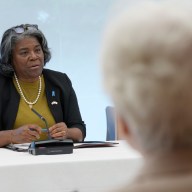If there’s any indie rocker that you’d want as your mom, it’s got to be Julie Doiron. The New Brunswick-based singer-songwriter’s three kids are just learning about music and what better teacher to have than this former Eric’s Trip darling.
“My 14-year-old son has been playing guitar for a year,” she says. “But he plays more when I sit down with him and teach him.”
A few more lessons and, who knows, he might lead another East Coast rock revolution like Eric’s Trip did in the early ’90s. And, if he, or Doiron’s two girls, decides to make a serious go at a music career, she obviously can’t stop them.
“I would have to support them,” she says. “But it’s up to them. I’m not going to push them to do anything.”
If they do get serious about a music career, at least they have a good musical role model to look up to. Doiron has one of the more eclectic Canadian careers, signing to Sub Pop with Eric’s Trip in 1993, winning a Juno seven years later, and she’s just released I Can Wonder What You Did with Your Day, her ninth solo album.
Unlike her previous disc, the Polaris Prize nominated Woke Myself Up, Doiron’s latest is a rockier, lo-fi affair reminiscent of her Eric’s Trip past. It’s also much more upbeat than a lot of her previous albums.
“Right now I’m a pretty happy person,” she says. “It took a long time to understand how to find that. I had a good marriage, the most amazing kids, but I was having a hard time finding a balance.”
In order to get to a more positive place, she had to separate from her husband and learn how to love again.
You’d think after an ordeal like that she’d be full of somber, introspective songs, but she reveals that she had trouble writing while her marriage was breaking up.
“I didn’t write any songs for the first year of having separated,” she explains. “I didn’t want to write about that. I actually didn’t want to write about anything. But then I started to fall in love again.”
The result is an album about discovery and emotional rebirth. “It’s about discovering someone new, being happy to be alive, surviving a breakup and realizing there is going to more after that,” she says. “That’s not it until you die.”
While the happier lyrics are refreshing, Doiron hasn’t turned into a twee pop act. There’s still moments of longing, confusion and doubt that puts a precarious spin on her newfound feelings.
“I’m never full on jolly,” she makes sure to point out. “I definitely feel better, but the record feels pretty human to me.”
















